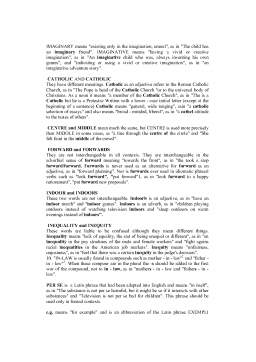Extras din curs
ECONOMIC SYSTEMS
The people and the institutions that combine together to covert resources into
finished products collectively form the economic system or economy.
The nature of the modern economy is fairly complex and no two economies are
exactly similar. Nevertheless, it is useful to identify three different kinds of economic
system: the market economy, the centralized or command economy and the mixed
economy. In general terms, a market is any means of bringing people together to buy
and sell goods. Two conditions are necessary for goods or services to be produced in
this economy. First there must be a demand for the goods - there must be people
willing and able to buy them at prevailing princes. Second, producers must be able to
sell their goods at a profit. In the market economy, the combination of consumers
seeking the best value for money and producers seeking efficient production
determines the use of resources. Some systems do not trust the market mechanisms,
and in extreme cases they abandon them altogether. Although the motive for this may
be mainly political, there are clear economic implications. Instead of the market
determining what is produced, decisions are taken by the Government. This is because
a Government is likely to have priorities different from those of individuals. This kind
of economy does have the important disadvantages of needing a large number of
administrators to make decisions. What has happened in practice is that most
economies have developed as a mixture between the market economy and the
centralized economy.
The balance between the market economy and the Government's control of the
economy will vary from country to country, the degree of Government involvement
depending on the political objectives of the Government itself.
UNIT 2:
THE ECONOMIST AND THE SOCIETY
Economics is concerned with the ways in which various scarce economic
resources are converted into goods and services required within the community.
There are several ways in which an economist might deal with the processes that are
within an economy. For example, (s)he might simply observe what is going on and
record it. When investigating the operation of a economy, the economist is dealing
with people and they are not only different, they are unpredictable; (s)he cannot
gather them together in a laboratory, eliminate friction, gravity as idiosyncrasy, make
assertions about the effects of the various economic policies. What (s)he can do is to
examine society as it is, study its reactions to past experiments in economic policies,
and on this basis, try to forecast its response to new policy initiatives. (S)he may be
assisted by the construction of economic models, designed to highlight certain aspects
of economic life. An economic model is really a mathematical representation of an
economy (or part of an economy) which enables the relationship between certain
causes and effects to be examined. It is important to be clear about what use the
models have. They do not tell us what should be done; their purpose is to predict the
consequences of certain courses of action. For example, the Government might wish
to reduce tax revenue by a billion pounds. This might be achieved in a number of
ways; a reduction in the basic rate of income tax, a reduction in the higher rate of
income tax, a decrease in value added tax or excise duties or a combination of these.
The Treasure has a model of the economy and each of these projected changes can be
into it so that the likely consequences of each can be assessed. It is then a political
decision as to which course of action is taken; it is not a matter of a unique answer to
a problem.
The economist can point out the likely effects; the politician must balance
advantages against disadvantages before deciding on which course of action to take.
Preview document
Conținut arhivă zip
- Engleza in Domeniul de Afaceri.pdf





































































































































































































































